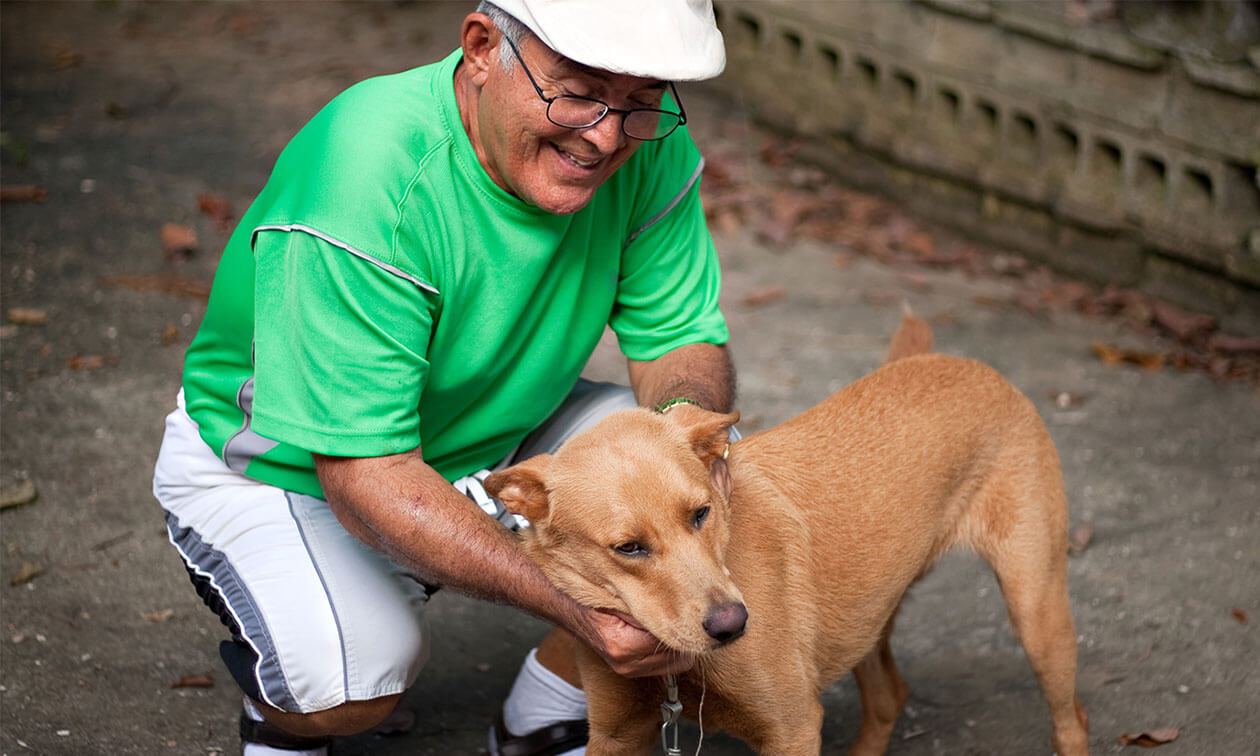The companionship of a dog can make a huge difference for seniors, providing connection, love, and a reason to stay active and social. Studies have shown that having a pet has health benefits, such as reduced stress, decreased blood pressure, lower cholesterol, and increased cognitive function in older adults1.
If you’re a senior citizen wanting to bring home a dog, you’ll want to consider what breed will be best for your lifestyle. Caring for a dog can include quite a bit of maintenance and training, depending on what breed or breed mix the dog is. Knowing what breed best matches your expectations is key to living in harmony with your new dog.
The Top 5 Dog Breeds for Seniors
Some of the best dogs for seniors are low maintenance breeds. Low maintenance dogs for seniors typically have a mild temperament, easy-to-manage size, minimal grooming requirements, and few health issues. Some breeds particularly embody characteristics that make them ideal for senior living.
Cavalier King Charles Spaniel
This breed is the quintessential lap dog and little companion. Cavaliers have sweet temperaments and loving personalities, along with being sociable with people. This makes them a great dog breed to have if you have grandchildren coming to visit often. They are petite dogs, weighing 13 to 18 lbs. Their long and soft coat does require regular brushing and light trimming They are, however, prone to some health problems, such as heart disease.
Shih Tzu
This breed is often recommended for seniors, as Shih Tzus are friendly entertainers and a great compact size, weighing eight to 16 lbs. They love to put on a show for their people with their quirky play antics and then curl up on your lap for cuddles. Their coat does require regular maintenance, either with daily brushing if you want to keep it long or monthly grooming to keep it trimmed short to avoid matting.
Cardigan Welsh Corgi
The Cardigan Welsh Corgi is the lesser known of the two types of Corgis (Pembroke Welsh Corgis are the other). Cardigans tend to be on the lower-energy side of the two, happy to snuggle on the couch or go for long walks with you. Eager to please, they do need regular training and exercise for mental enrichment.
Their thick double coats shed often and require weekly brushing. During shedding season, Corgis need daily brushing. Despite their short legs, they’re considered a medium-sized dog, ranging between 25 and 40 lbs. Cardis are a great option for people looking for a “large dog in a small package.”
Pug
This well-known breed can make a great pet for seniors. Weighing 14 to 20 pounds, they have a big personality in a small package! Pugs love to entertain and get attention, making them a great choice for families with grandchildren. Their short coats are easy to groom but do shed and need regular brushing.
One big consideration to keep in mind is that due to their flat faces, this brachycephalic breed tends to have breathing problems and may require extra veterinarian care. They tend not to tolerate heat well.
Poodle
This incredibly smart breed comes in many sizes and can be a great companion. Toy and Miniature Poodles love to be lap dogs and accompany their people to a variety of places. Toys are the smallest of this breed, weighing only up to 10 pounds, while Miniature Poodles can weigh up to 15.
Moyen Poodles are medium-sized and generally weigh up to 35 pounds. Standard Poodles are the largest of this breed and can weigh up to 70 pounds.
Regardless of size, Poodles’ coats don’t shed but do require regular trims and grooming. This intelligent breed also has a lot of energy needs regular mental enrichment to keep them happy.
Size Matters
Some of the best dogs for older people are small to medium-sized. Their smaller size means it is easier to manage them on leash, get them in and out of vehicles, and carry them if ever needed. Smaller dogs are also easier to find housing based on weight restrictions for pets. However, small dogs can easily get underfoot and present a tripping risk if not well-trained.
Age Matters
Young puppies, no matter the breed, require lots of attention, training, and what feels like never-ending potty breaks. Puppy nipping can also be an issue for older adults, as their sharp teeth can easily cause injury to sensitive skin. Dogs can live up to 15 or more years, so you’ll also want to consider how a dog will fit into your long-term plans.
If raising a puppy sounds overwhelming, then look for an adult dog two years or older. At that age, you can see their full personality and temperament, and it’s easier to identify what training they still need, if any.
Senior dogs can be a wonderful choice as well, and are often overlooked in shelters, so consider fostering or adopting if you’re looking for a low-key companion. Senior dogs often need more veterinary care, so make sure that’s in your budget or covered by the rescue if you’re fostering.
Low Maintenance Grooming
All dogs need regular brushing, ear cleaning, tail trims, and baths. Even so, some require a lot more grooming than others.
Non-shedding dogs like Poodles and Shih-Tzus don’t leave hair around the house, but the trade-off is that they require regular trims and frequent brushing. Breeds with short, single-layer coats don’t shed a lot and only require weekly brushing.
Energy Levels
Choosing a dog that matches your activity level is important. Dogs historically bred for companionship tend to be the best match for seniors. While these dogs still need regular exercise and mental enrichment, they don’t need as much as dogs who have historically been bred to do demanding jobs such as herding, hunting, or vermin control.
Other Top Dog Breeds for Seniors
Other popular dog breeds for older people include:
- Chihuahua
- Yorkshire Terrier
- Dachshund
- Miniature Schnauzer
- Labrador Retriever
- Golden Retriever
- West Highland Terrier
There are hundreds of dog breeds to pick from, after all.
Some of the best dog breeds for seniors are mixed breeds. There are many available for adoption that can make companions. Look for a dog that matches your preferences when it comes to energy level and coat maintenance. Think about what size of dog you can handle on leash and in other handling, like for transportation or bathing. Taking the time to outline what will work best for your lifestyle will make choosing a dog easier and set them up for success in your home.
Medical Considerations for Seniors Adopting Dogs
It’s a good idea to research the common health issues for any breeds you’re considering. This can impact a senior’s ability to care for the dog. And some common medical conditions come with considerable veterinary expenses that can be a challenge for someone on a fixed income. For example, dogs predisposed to heart issues or environmental allergies can mean extensive vet visits, medications, etc.
ZPC-04250
- How to Stay Healthy Around Pets and Other Animals. Centers for Disease Control and Prevention. https://www.cdc.gov/healthypets/keeping-pets-and-people-healthy/how.html. Accessed June 30, 2023.



